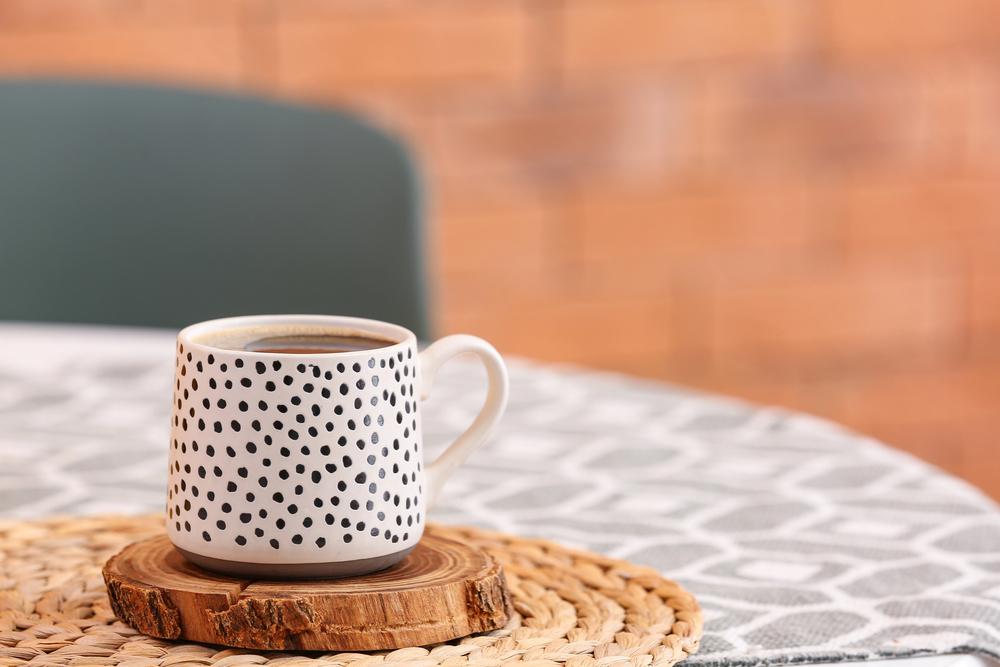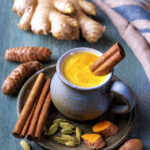
The Best Coffee Alternatives: Caffeine-Free, Nourishing, and Gut-Friendly
Coffee isn’t for everyone. Whether it’s caffeine, acidity, or health concerns, here’s how to find the right alternative — and why not all substitutes are created equal.

If you’re looking for a roasted, caffeine-free blend made from real herbs, the Sip Herbals Coffee Alternative is our flagship pick — organic, gluten-free, and completely caffeine-free.
Quick Summary / Key Takeaways
- Nothing tastes exactly like coffee except coffee; good substitutes are their own delicious ritual.
- Some “alternatives” still have caffeine (e.g., popular mushroom blends), or gluten-containing grains (barley/rye) that won’t fit gluten-free/AIP needs.
- Teeccino sells two types: classic blends that include barley and a certified gluten-free line made without barley; some flavors use natural flavors. Read labels.
- Mud\Wtr and many Four Sigmatic coffees contain mushrooms and caffeine (Mud\Wtr ~35 mg/serving; Four Sigmatic “Think” coffee ~150 mg/12 oz).
- Dandy Blend, Pero, and Inka are grain-based instants (barley/rye extracts). Dandy Blend’s gluten-free labeling has been contested by Gluten Free Watchdog.
- Sip Herbals uses whole roasted herbs (e.g., dandelion, chicory, carob). Flavored blends use real-food ingredients (e.g., cinnamon, cacao) — no “natural flavors.”
Stats Snapshot & Comparison Table
| Brand / Beverage | Caffeine | Gluten-Free? | Mushrooms? | “Flavors” | Notes |
|---|---|---|---|---|---|
| Coffee (8 oz) | ~95 mg | Yes | No | — | Typical brewed coffee caffeine; still acidic. Mayo Clinic |
| Decaf coffee (8 oz) | ~1–2 mg | Yes | No | — | Not zero caffeine; still acidic. Mayo Clinic |
| Teeccino | 0 mg | Varies (classic lines include barley; gluten-free line made without barley) | No | Some SKUs use “natural flavors” | Check label: some blends contain barley; GF line is certified GF; FAQ explains natural flavors. |
| Mud\Wtr (Original) | ~35 mg/serving | Yes | Yes | No | Masala chai (black tea) + mushrooms; brand discloses ~35 mg. |
| Four Sigmatic (Think Ground Coffee) | ~150 mg/12 oz | Yes | Yes | No | Coffee + lion’s mane/chaga; not a caffeine-free substitute. |
| Dandy Blend | 0 mg | Contains barley/rye extracts | No | No (instant extracts) | Watchdog disputes “gluten-free” compliance; ingredients include barley/rye extracts. Gluten Free Watchdog |
| Pero | 0 mg | No (barley, rye) | No | No | Grain-based instant: barley, malted barley, chicory, rye. |
| Inka | 0 mg | No (barley, rye) | No | No | Grain-based instant: barley, rye, chicory, sugar beet. |
| Sip Herbals | 0 mg | Yes | No | Yes — real-food flavors (e.g., cacao, cinnamon), no “natural flavors” | Whole roasted herbs; gluten-free; caffeine-free. |
Note on Teeccino: they explicitly sell a gluten-free line made without barley alongside barley-containing lines; and their FAQ explains the use of natural flavors in some SKUs. Always check the product’s ingredient list.
Simple Swaps
- Choose truly caffeine-free substitutes when you’re reducing/avoiding caffeine.
- Avoid barley/rye if you need gluten-free or are on AIP.
- Prefer whole-ingredient flavoring (cacao, cinnamon, peppermint) over generic “natural flavors.” =
Extra Tips
- For a coffee-like ritual, brew roasted dandelion + chicory blends via French press/pour-over.
- Add cinnamon, ginger, vanilla for warmth and easy digestion.
- Transition by mixing 50/50 coffee + herbal for a week, then taper.
Intro
Coffee is beloved, but it doesn’t love everyone back. For some, caffeine disrupts sleep and spikes anxiety; for others, acidity aggravates reflux or gut issues. If you’re pregnant, on an anti-inflammatory or AIP path, or just ready for calmer energy, coffee alternatives help — as long as you pick the right kind. The honest truth: nothing tastes exactly like coffee except coffee. The goal is a cozy, roasted ritual without caffeine, acidity, or sneaky additives.
Table of Contents
FAQs Section
1. Why switch from coffee to alternatives?
Direct Answer: People switch because caffeine can disrupt sleep, raise anxiety, and affect pregnancy, while acidity worsens reflux and gut irritation.
Depth: For autoimmune or anti-inflammatory diets, coffee may also aggravate symptoms.
Real Results: Many report more stable energy and less reflux when swapping.
Takeaway: Coffee alternatives are about comfort without the caffeine and acid load.
2. What makes a good coffee substitute?
Direct Answer: A good substitute is caffeine-free, gluten-free, and made from whole herbs or roots.
Depth: Chicory, dandelion, and carob provide a roasted taste without the downsides.
Real Results: These herbs give fullness and ritual without mimicking coffee exactly.
Takeaway: The best substitutes are whole-food based, not grain extracts or mushroom coffee.
3. Are decaf and green tea good alternatives?
Direct Answer: Not really. Decaf still contains trace caffeine and acidity, and green tea has 25–30 mg caffeine.
Depth: Green tea can also interfere with iron absorption in pregnancy.
Real Results: They’re fine for occasional use but not true substitutes.
Takeaway: For everyday use, look for herbal, caffeine-free options.
4. Which herbal bases are best?
Direct Answer: Roasted dandelion root, chicory root, and carob are top choices.
Depth: Dandelion supports digestion, chicory provides smooth body and prebiotic fiber, and carob adds natural sweetness.
Real Results: Together, they create a satisfying ritual with a rich, roasty profile.
Takeaway: Choose blends built on roasted roots and carob for best results.
5. Is there a coffee alternative that tastes exactly like coffee?
Direct Answer: No — coffee is coffee.
Depth: Some brands add flavors to mimic coffee, but it usually disappoints.
Real Results: The most satisfied customers embrace alternatives as their own ritual, not a replica.
Takeaway: Look for richness and warmth, not a carbon copy of coffee.
6. Are mushroom coffees good substitutes?
Direct Answer: Mushroom blends like Mud\Wtr and Four Sigmatic often still contain caffeine.
Depth: They may offer adaptogen benefits but lack safety data for pregnancy and autoimmune diets.
Real Results: Some users enjoy them; others report jitters or digestive upset.
Takeaway: They’re not ideal if your goal is caffeine-free and safe across conditions.
7. Are coffee alternatives safe in pregnancy?
Direct Answer: Yes — if caffeine-free, gluten-free, and free from unsafe herbs.
Depth: Dandelion, chicory, and carob are generally considered safe. Barley-based and mushroom blends are not.
Real Results: Many pregnant women use roasted herb blends as safe morning rituals.
Takeaway: Always check ingredients and confirm with your healthcare provider.
8. What’s the healthiest coffee alternative?
Direct Answer: Whole roasted herb blends with no caffeine, gluten, or added “natural flavors.”
Depth: Chicory and dandelion provide fiber, minerals, and digestive support.
Real Results: Customers report better gut comfort and calmer energy.
Takeaway: Skip instant grain extracts and flavored shortcuts — choose clean blends.
Sip Herbals vs Teeccino
Direct Comparison
| Teeccino | Sip Herbals | |
|---|---|---|
| Caffeine | 0 mg | 0 mg |
| Gluten-Free? | Varies: classic lines include barley; gluten-free line made without barley | Yes |
| “Flavors” | Some SKUs use “natural flavors” (per company FAQ) | Real-food flavors only (e.g., cacao, cinnamon) |
| Mushrooms | No | No |
| Notes | Check label: some products contain barley; natural flavors used in certain flavors | Whole roasted herbs; clean-label flavored options |
Teeccino is the legacy herbal “coffee.” Important nuance: some blends use barley (not GF/AIP), but Teeccino also offers a certified gluten-free line made without barley. They also explain their use of natural flavors (e.g., coffee WONF) in certain SKUs. Read the ingredient list to ensure a barley-free, flavor-additive-free choice that fits your needs.
Sip Herbals vs Mud\Wtr
Direct Comparison
| Mud\Wtr (Original) | Sip Herbals | |
|---|---|---|
| Caffeine | ~35 mg/serving | 0 mg |
| Mushrooms/Adaptogens | Yes (lion’s mane, chaga, reishi, cordyceps; chai spices) | No |
| Gluten-Free? | Yes | Yes |
| “Flavors” | No added “natural flavors” | Real-food flavors only |
| Notes | Not caffeine-free; mushroom/adaptogen blend | Whole roasted herbs; caffeine-free, mushroom-free |
Mud\Wtr positions itself as a coffee alternative but still contains caffeine (around 35 mg/serving) and a mix of mushrooms/adaptogens. If you’re aiming for truly caffeine-free or avoiding mushrooms (e.g., pregnancy, sensitivities), this isn’t the ideal swap.
Sip Herbals vs Four Sigmatic
Direct Comparison
| Four Sigmatic “Think” Ground Coffee | Sip Herbals | |
|---|---|---|
| Caffeine | ~150 mg/12 oz | 0 mg |
| Mushrooms | Yes (e.g., lion’s mane, chaga) | No |
| Base | Coffee | Roasted herbs |
| “Flavors” | No added flavors | Real-food flavors only |
| Notes | Not a caffeine-free substitute; it’s coffee with mushrooms | True coffee alternative (no coffee/caffeine) |
Four Sigmatic’s flagship “mushroom coffee” is still coffee — with caffeine comparable to regular brews. It’s not a caffeine-free substitute; it’s coffee + functional mushroom extracts.
Sip Herbals vs Dandy Blend
Direct Comparison
| Dandy Blend | Sip Herbals | |
|---|---|---|
| Caffeine | 0 mg | 0 mg |
| Gluten/Grains | Barley & rye extracts | Grain-free |
| Form | Instant extract | Brewed from whole roasted herbs |
| “Flavors” | No | Real-food flavors only |
| Notes | Company markets “gluten-free,” but watchdogs have disputed compliance due to barley/rye extracts | Whole-ingredient, clean-label approach |
Dandy Blend is convenient and popular, but it’s made from barley/rye extracts. Gluten Free Watchdog has repeatedly raised concerns about the gluten-free labeling on products containing barley/rye extracts. If you need gluten-free or are on AIP, proceed carefully. Gluten Free Watchdog
Other Grain Instants (Pero, Inka)
Pero lists barley, malted barley, chicory, rye; Inka lists barley, rye, chicory, sugar beet. Both are not gluten-free and not suitable for AIP elimination.
Advanced Tips / Best Practices
- Brew herbal blends like coffee (French press, pour-over) for full body.
- Spice it: cinnamon, cardamom, ginger, vanilla.
- Transition gradually (50/50 coffee + herbal), then taper to 100% herbal.
Where to Learn More
Curious about clean, gluten-free, caffeine-free roasted herb blends? Explore options at Sip Herbals.
Next Steps / Wrap-Up
Coffee alternatives aren’t about tricking your taste buds; they’re about building a calmer, kinder ritual. Many “alternatives” quietly include caffeine (mushroom coffees) or grains (barley/rye). The cleanest swaps use roasted herbs, real-food flavors, and no stimulants — so you get comfort without compromise. While there are plenty of great coffee substitutes out there, Sip Herbals stands out for using whole roasted chicory, carob, and dandelion — no fillers, no grains. Explore the Signature Roast Coffee Alternative here.
Author Bio
Written by Orleatha Smith, Certified Master Herbalist
Orleatha Smith is a Certified Master Herbalist and co-founder of Sip Herbals, a coffee alternative designed to deliver steady, caffeine-free comfort. With a background in biology and an advanced degree in education, she’s spent over a decade helping people explore natural approaches to health, and has been featured on Shark Tank, in First For Women, The Los Angeles Times, WebMD, and more.
Disclaimer
Educational content, not medical advice. Always consult your healthcare provider about diet changes, especially if pregnant, nursing, or managing a medical condition.




